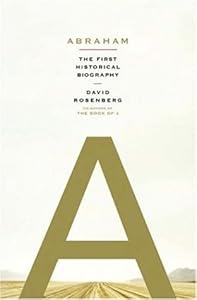Abraham
Wednesday, July 18, 2007
 Cover of Abraham: The First Historical Biography
Cover of Abraham: The First Historical BiographyAbraham: The First Historical Biography
By David Rosenberg, 2006, hardback, from the library
You should know
I was a theology minor, and have always done well with religion or theology classes in school. As a small child, my bedtime stories were Bible stories.
So?
This was an intriguing book. Rosenberg uses what has been discovered about ancient Sumer to construct a biography of Abraham and his family, their journey to Canaan, and their shifting relationship with God.
However, I took issue with a few premises.
Because of the culture, Rosenberg assumes Abraham was well-educated, and manages to justify this assumption fairly well - Sumer, as it turns out, was an advanced, literate society. However, Rosenberg takes it step farther, insisting that that Abraham’s father, Terah, was a sculptor of city idols (according to Wikipedia, this is a Midrash story, but Rosenberg doesn't get into this), and that Abraham was a scribe. The Abraham-as-scribe part is decently justified, but the rest is less so.
Another point I wasn’t sure about is the description of Abraham’s wife. Sarah is said to be Abraham’s half-sister (though Rosenberg is unclear which parent they share, one would assume it’s Terah), based on Abraham’s telling authority figures just that story in order to save his own life, as well as on a specific kind marriage contract that makes a man’s wife legally his sister as well. These are interesting points, but not points that have me quite convinced of the premise – then again, I’m not a history scholar, so I might be missing something. Also, Rosenberg claims that Sarah made the clothing for the city idols – based largely on the premise that she was part of Terah’s family, and that’s what the family did. Again, an interesting interpretation, but one I found lacking in evidence.
Of course, Lot is also once referred to as Abraham’s half-brother, and that came out of nowhere and went nowhere, with no justification – especially since Rosenberg agreed with scripture that Lot’s father was Abraham’s brother. The implications there… well, they're rather Oedipal.
One extremely interesting aspect of the book was the way the evolution of Abraham’s God paralleled Abraham’s own life. Rosenberg suggests that Yahweh was originally one of Terah’s household gods, which rose in both esteem and ability as Abraham found himself in a new land with a new role in life. A third parallel is the narrative of the narrative; that is, the tale of how the story as we know it got passed on. Rosenberg is an authority on at least this point: he is one of the translators of The Book of J, one of the proto-texts for the Book of Genesis we have now. Different storytellers recast the events for different audiences, leading to eventual inconsistencies of action and character on the part of both Abraham and Yahweh.
I don’t know whether to call it wise or cowardly (they’re hardly mutually exclusive), but Rosenberg is also very careful never to take a stand on Yahweh. I for one could not quite tell if he believed in the Abrahamic God of today or in a family statue that somehow gained worldwide worship. As a historian, he probably made the right choice, but given his speculation in other areas, this lack of solid stance was disappointing.
More disappointing, though, were a few errors I noticed – inconsistencies in the way proper names were spelled, for instance. This stood out as sloppy, and will hopefully be corrected in future editions.
Rating
Well, I liked it…
…But I don’t believe it’s everyone’s thing. It’s a slow read, and the information I outlined above barely scratches the surface of the subject material. If you’re interested in theology or history, or just want to soak up some random knowledge for a cocktail party, you’ll find plenty. But this is only a beach read if you like them mindful, rather than mindless.
The rest of the Internet
Abraham's Wikipedia page.
Entries on Abraham in the Jewish Virtual Library and Catholic Encyclopedia.
How much do you know about Abraham? I got a 100%, though I had to guess once or twice.
The book's page at LibraryThing.
A Publisher's Weekly interview with the author.
JD at Point Pleasant enjoys the book and reflects on his own patriarchy.
